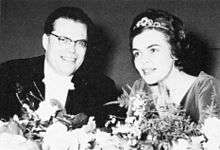Erik Werba
Erik Werba (23 May 1918 – 9 April 1992) was an Austrian classical pianist who is especially known as an accompanist of singers. He was also a music critic, conductor, composer, author and academic teacher.[1]
Erik Werba | |
|---|---|
 Erik Werba (left) with Raili Kostia in Helsinki, 1960 | |
| Born | 23 May 1918 Baden bei Wien, Austro-Hungarian Empire |
| Died | 9 April 1992 (aged 73) Hinterbrühl. Austria |
| Education |
|
| Occupation |
|
| Organization |
|
Career
Werba was born in Baden bei Wien,[2] the son of Ludwig Werba (1884–1945), who was born in Graz and became a composer, music director and vice-president of the Österreichisch-ungarischer Musikerverband, founded in 1896. Ludwig Werba died in a bombing raid on 2 April 1945.[3]
Werba completed the Matura at the Baden Gymnasium in 1936. He then studied at both the Akademie für Musik und darstellende Kunst in Vienna and the University of Vienna,[4] where he earned a PhD in 1940.[5] He worked as a music critic and teacher, and directed the Mozartgemeinde after World War II. Werba was Kapellmeister at the Stadttheater Baden from 1945 to 1946.[6] As a pianist, he focused on accompanying lieder singers.[7] He collaborated with Irmgard Seefried, Christa Ludwig, Walter Berry, Kim Borg,[8] Brigitte Fassbaender,[7] Peter Schreier[9] and Nicolai Gedda,[10] appearing internationally.[8]
Werba was a professor of lied and oratorio at the Wiener Musikakademie from 1949 to 1990,[1] and from 1964 to 1971 also at the Akademie für Musik und darstellende Kunst in Graz. As a journalist, he worked for the newsletters of the Mozartgemeinde, the Wiener Figaro, the Österreichische Musikzeitschrift and the periodical Musikerziehung.[11] As a composer, he wrote incidental music, chamber music and lieder.[1]
Werba died on 9 April 1992 in Hinterbrühl. He is buried at the Maria Enzersdorf cemetery.[1]
Publications
Awards
- 1960: Mozartmedaille awarded by the Mozartgemeinde Wien[17]
References
- "Erik Werba" (in German). Österreichischer Cartellverband. Retrieved 17 February 2019.
- Erik Werba oxfordreference.com
- K.: Badener Stadtnachrichten. In memoriam Ludwig Werba. In: Badener Zeitung, 14 July 1945, p. 3 (Online at ANNO)
- 21 May 1968: 50. Geburtstag von Erik Werba
- Erik Werba: Die Rolle und Bedeutung des Sängers bei Homer, Hesiod und Pindar. Dissertation. Universität Wien, Wien 1940, OBV.
- Franziska Dzugan: Chamäleons im Blätterwald. Die Wurzeln der ÖVP-ParteijournalistInnen in Austrofaschismus, Nationalsozialismus, Demokratie und Widerstand. Eine kollektivbiografische Analyse an den Beispielen Wiener Tageszeitung und Linzer Volksblatt 1945 bzw. 1947 bis 1955. Dissertation. Universität Wien, Wien 2011, p. 171. – Volltext online (PDF; 1,4 MB).
- "Stets "am Klavier: Erik Werba"" (in German). ORF. 24 May 2018. Retrieved 19 May 2019.
- "Seefried, Ludwig, Berry und Borg waren die Sänger mit denen ich die Welt bereist habe." – Erik Werba in an earlier studio discussion. Broadcast on 24 May 2018 in Stimmen hören on Ö1
- "Peter Schreier – Mozart-Lieder". belvedere-edition.de (in German). Retrieved 19 May 2019.
- "Nicolai Gedda • Erik Werba" (in German). Musikverein. Retrieved 19 May 2019.
- Arbeitsgemeinschaft für Musikerziehung in Österreich (AGMÖ): Musikerziehung mit AGMÖ-Nachrichten. AGMÖ, Wien 1947/48–, OBV.
- Richard Strauss zum 85. Geburtstag Österreichischer Bibliothekenverbund
- Josef Marx, eine Studie Österreichischer Bibliothekenverbund.
- Hugo Wolf oder – Der zornige Romantiker Österreichischer Bibliothekenverbund
- Erich Marckhl Österreichischer Bibliothekenverbund
- Hugo Wolf und seine Lieder Österreichischer Bibliothekenverbund
- "Gedenktafeln in Wien / Mozartgemeinde Wien / Träger der Mozart-Medaille / Deutschordenshof, Singerstraße: Erik Werba 1960". viennatouristguide.at (in German). Retrieved 17 February 2019.
External links
- Literature by and about Erik Werba in the German National Library catalogue
- Erik Werba (biography) tobias-broeker.de
- Erik Werba im Austria-Forum
- Erik Werba discography at Discogs
